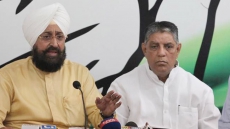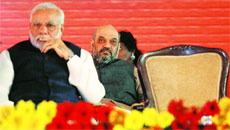A day after exit polls predicted a majority for the BJP-led National Democratic Alliance, some political experts said the result was still not a foregone conclusion and that the Balakot air strike may not play a major role in the final poll outcome.
"I will not comment on the exit polls. The election has been stretched unusually. The exit polls before the election and now will be different. Those who voted in the first phase will not have the same mindset with that of those voting in the last phase. I am not ready to believe such exit polls and it will be better if we wait for the results," said author and historian Dilip Simeon.
Delhi University's Professor Apoorvanand criticised the BJP for not letting people question the Balakot air strike while taking credit for it.
"People are saying the exit polls can be wrong. But if we say that the exit polls are correct, we should also say that along with the BJP, certain government bodies, the election commission, and the media, particularly the news channels, were contesting the election on the (BJP) government's behalf. All this was happening actively without any shame. This was a very weird election," he said.
He also said the question should be asked why Balakot and Pulwama took place just before the polls.
"We were not even allowed to ask how and why such a security lapse took place. Nobody asked this question. A hard nationalism was played. Nobody is questioning the active violence in West Bengal and Assam. If we consider the exit polls to be correct, we should also say that the farmer had forgotten what happened to them, the youth forgot they had no jobs and the traders forgot the impact of Goods and Services Tax and demonetisation," Apoorvanand added.
Analyst Sandeep Shastri, on the other hand, said several factors are playing a role in favour of the BJP.
"Balakot is one of the factors, but not the only one. There are a basket full of things, and the attack can be one of them. The way the government has projected the air strike, it has definitely benefited the BJP. But the leadership of Prime Minister Narendra Modi and the lack of opposition faces are also factors," Shastri added.
In February, a Jaish-e-Mohammad suicide bomber had attacked a convoy of the Central Reserve Police Force in Pulwama in Kashmir killing 40 troopers. In response, the Indian Air Force launched an air strike and attacked the Balakot terrorist training facility in Pakistan, inflicting "a large number of casualties".

